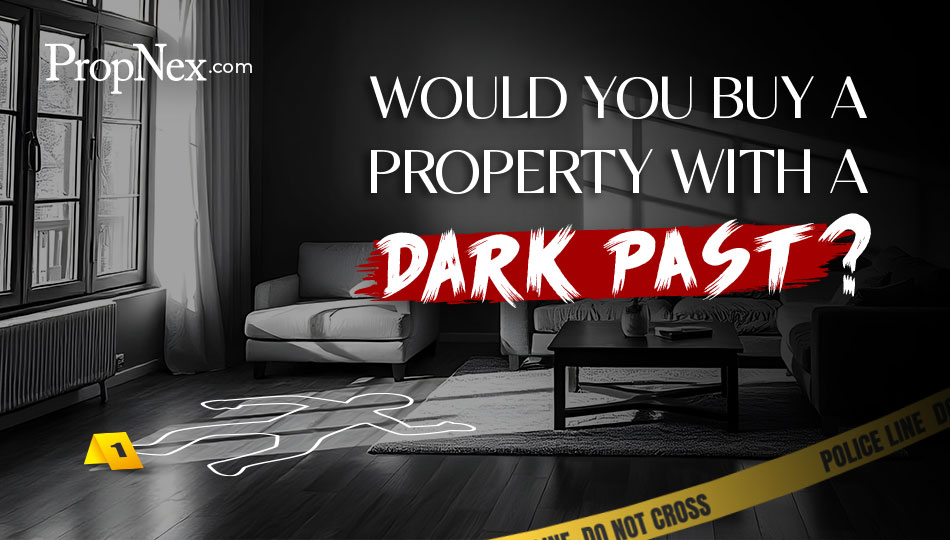
Leeann Chan
Research Analyst

They have been on the news, and may even have dominated private conversations - incidents where a violent crime or a family tragedy had happened at certain residential properties.
Thankfully, such cases are rare here, but when they do happen, these homes may be seen by some as 'stigmatised properties' - where a negative or distressing event has taken place, including cases of unnatural death like suicide or murder.
Typically, the exact location/ unit number of such properties is not disclosed to the public. Prospective homebuyers who suspect that there may be a 'back story' to a resale property that they are keen on buying may want to check with the seller or the seller's real estate agent ("RES") to clarify the matter - particularly if they have concerns about purchasing a home where a violent crime or homicide took place. In fact, the same checks may apply to prospective renters looking at homes for lease if they are squeamish about renting such properties.
For those who are dead set against buying such homes, it is all the more crucial to find out about the back story before entering into a contractual agreement to purchase the property. Should the buyer decide to back out from a deal after he/she has exercised the option-to-purchase (OTP), any deposit paid to the seller will be forfeited.
Are agents obliged to disclose such 'history' behind a property?
By way of background research, the prospective buyer could hit up the internet to check for news relating to the housing block or condo project. If they sense that there may be more to it, they could ask residents in neighbouring units, and check with the seller and seller's RES.
Presently, sellers and their appointed RES are not required by law to voluntary disclose recent death arising from unnatural causes in the property. However, as stipulated by the Council for Estate Agencies (CEA) Professional Services Manual para 3.8.3(d), the seller's appointed RES is obliged to find out from the seller and convey material information on the property - including any recent case of unnatural death - when asked by the buyer or the buyer's RES. Our understanding of "unnatural death" under pada 3.8.3(d) is it excludes natural deaths due to old age or sickness.
If there are no questions asked by the buyer or buyer's RES prior to transacting the property, they will not be able to claim misrepresentation against the seller and the seller's RES subsequently, should the buyer later discover that there was a case of such death at the property.
What could constitute a case of misrepresentation would be if the buyer or buyer's RES had asked about it prior to completing the sale, and: 1) the seller had lied to his/her appointed RES that there was no such event; 2) if the seller had informed the RES of a case of unnatural death and told the RES not to disclose to the buyer or buyer's RES; and 3) if the seller had told the seller's RES, who failed to then relay the information to the buyer or buyer's RES.
Consider also a scenario where the buyer or buyer's RES had remarked in passing during a viewing that for fengshui reasons, the property must not have a case of unnatural death. If the seller's RES is aware that there is indeed such as case in the property and chooses to keep quiet about it after hearing the remark - this could also amount to misrepresentation.
Depending on the scenarios laid out above, either the seller or the seller's RES, or both could be liable for misrepresentation, and the agent may additionally be in breach of the CEA's Professional Services Manual.
Unnatural deaths and stigmatised properties
While these cases may be the talk of the town for a while, they too, fade into memory over time, says Ray Teo, who is the Advisory Associate Branch District Director at PropNex Realty. Mr Teo, a seasoned RES, used to keep track of stigmatised properties, and even listed some of them on his personal webpage.
"High profile cases are often publicised in the media... Buyers can research more on the property and make an informed purchase, particularly if they are uncomfortable with buying a stigmatised property. They can also seek clarification with the seller or the seller's agent," Mr Teo told PropNex Picks.
While Mr Teo has not personally transacted any stigmatised property per se, he has sold an HDB flat in Tampines that is located on the same storey as a unit, where a woman and two children were found dead; a man was also found dead at the foot of the block in what was ruled as a case of murder-suicide back in 2005.
Mr Teo recounted, "I was marketing the other unit before the murder-suicide case, and on the day the that OTP was supposed to be signed, the block was cordoned by the police. It took me three more months to market that unit - even though it was not the flat where the tragedy happened. I recall the flat was subsequently sold at a discount, as the seller has got their new BTO flat and needed to sell their existing flat."
In another incident, Mr Teo shared that he and a buyer was at the void deck of an HDB block, and just when the buyer was on the verge of signing the OTP, a person had committed suicide and landed at the foot of the block.
"The buyer tore up the OTP and decided not to proceed. Although the suicide did not take place in the unit itself, the buyer did not feel comfortable purchasing the flat as it is on the second floor, and the window overlooks where the person had landed on the ground floor," Mr Teo explained.
Buying and selling stigmatised properties
While some owners of stigmatised properties - where an unnatural death had taken place - may wish to dispose of the property at short notice, others could sell it at a later date. An important consideration is the manner of property ownership - whether it is under joint tenancy, tenancy-in-common, or sole ownership. There are due legal processes to take when it comes to the transference of ownership, if the property is held under tenancy-in-common or sole ownership.
"The inheritance procedure could sometimes take a year, or a year and half, and the case may be forgotten after a period of time. Generally, while some buyers may be a hesitant to purchase a property where there has been a gruesome crime, there are also others who don't mind," Mr Teo said.
Some owners of stigmatised properties may do a light renovation before putting up the unit for sale, and they may be open to offering a 5% to 8% discount on the asking price, but there's no real science to it. Ultimately, for prospective buyers who suspect that a unit they are keen on may be a stigmatised property after doing their own background checks - and if it matters to them - it is best to ask the seller and the seller's RES about it before committing to the purchase.









